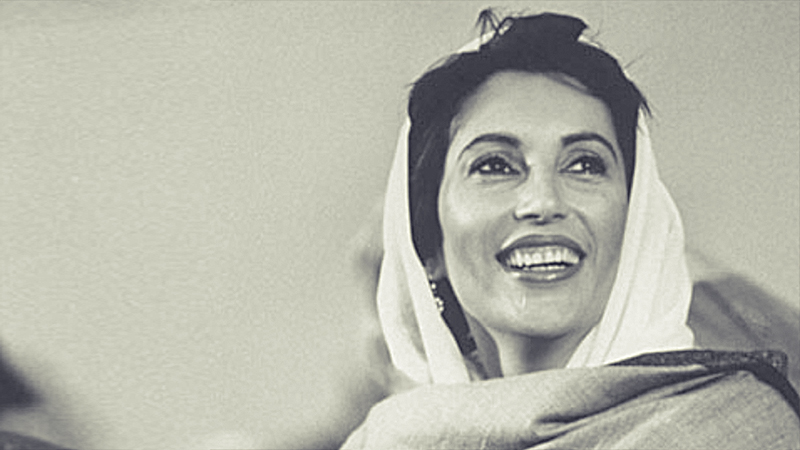
The white dupatta perched on her head, her flawless skin epitomising divine beauty, and her indomitable eyes speaking volumes about how tragedies moulded her life, not in an ordinary but an extraordinary way. She lost her father when he was hanged, and her brothers died mysterious deaths. She, herself, was incarcerated and put into solitary confinement. But all of this did not diminish her conviction; it only resulted in immenseness and enormity of commitment, dedication, and love for her people.
People talk about courage, and it seems an unreal idea, like a myth – something beyond one’s imagination. Some people get to witness that courage in real life. But it rarely happens that you see magnificence of courage in a woman, generally considered to be more sentimental than brave, and that courage inspires and ignites the spirit in such a way that the wolves wish to strip her of all her power, but are unable to do so. Such was the epitome of Benazir Bhutto.
Benazir Bhutto, at a young age, realised the gravity of tragedies, sorrows, miseries, and grief. She could have cloaked herself in a blanket of comfort and ease, and left the prickly path of politics. She could have let her eyes swell with tears streaming through them, at the calamities that unfolded her path. She could have broken, shattered, taken an air of relief and go far away from the game that led her father to gallows.
But it rarely happens that you see magnificence of courage in a woman, generally considered to be more sentimental than brave, and that courage inspires and ignites the spirit in such a way that the wolves wish to strip her of all her power, but are unable to do so. Such was the epitome of Benazir Bhutto
But she was not of an ordinary breed. She was much more than what a dictator thought her to be. She was the one who embraced the swords raised against, the one who turned her tears into waves of bravery, the one who held her head high and did not let go of her set of values. She continued with the struggle and ideals of her entrancing father, Zulfiqar Ali Bhutto, and overcame the maneuvering and intrigue of the repressive regime of Zia ul Haq, immortalising her name in the annals of history forever.
She lived another life, a life that is impossible, a life that is unthinkable. The adversities that one cannot even conceive, she comprehended and portrayed them in her lifetime.
She had to bear separation from her children to continue to fight for an egalitarian Pakistan. Despite being in governance, she had to face challenges from bigotry, the bureaucracy and establishment. The arrogant and haughty men of Pakistan could not follow a woman; they could not bear her because she was stronger than them. She was refused being saluted by army officials, and had to face criticism from conservative mullahs. Pamphlets would be distributed, claiming that it was the religious duty of the people in the country to assassinate her, because she was a woman who had usurped a man’s place in an Islamic society. Each Friday sermons were given in mosques, inciting the people to overthrow the government. The opponents fulminated, calling her an “Indian agent” and an “Israeli agent”, but the people stood in solidarity with her. Several assassination attempts were made on her, including one within the first month of her election at the Lahore airport.
Despite challenges, her government embarked on a determined program of political liberalisation, an end to press censorship, legalise trade unions, and a commitment to the long-neglected social sector, with stress on education, health delivery, women’s rights, and macroeconomic reform. She introduced free print and electronic media, making Pakistan one of the 10 most important emerging capital markets in the world. Her government tackled the problem of power shutdowns, which had crippled the economy, as incentives were provided to the energy sector. The World Bank even called her energy program, along with her anti-polio campaign, a role model to the entire developing world.
During her term, over the span of three years, her government was able to electrify over 21,000 villages in the rural areas, and build 30,000 primary schools. 53,000 teachers were recruited for the latter, 70 percent of them being women. “Today’s young, your children and mine, are the children of the future, of the new century, the new world, the new information state. They are the ones who will move from the trees of the past to the forests of the future.”
She led Pakistan into the modern era, with her endless efforts to make Pakistan a house for investment, a crossroads between the ancient silk routes and the west. Foreign investment in Pakistan during her second term as Prime Minister was 5 times larger than the foreign investment in Pakistan in the previous 25 years.
As a Prime Minister, Bhutto faced a treacherous intelligence network that relentlessly threatened to dismiss Parliament. Both terms of the PPP, in power, ended on the basis of fictitious corruption incriminations, famous assertions often used to end democratic governments. However, she did not deter in her determination; her dedication to the people was interminable.
Her martyrdom was a lesson to the heart of democracy that dwindled into hopelessness. But the ceaseless ideals she preached are still whittled in its core – a lesson for the times to come. The past, utterly, illustrates her invincible legacy, and the future, certainly, divulges her insurmountable vision.
The writer is doing her Bachelors in English Literature from the University of London. She has a keen interest in politics, and aspires to write and bring about a change to misconceptions ingrained in our societal curriculum.